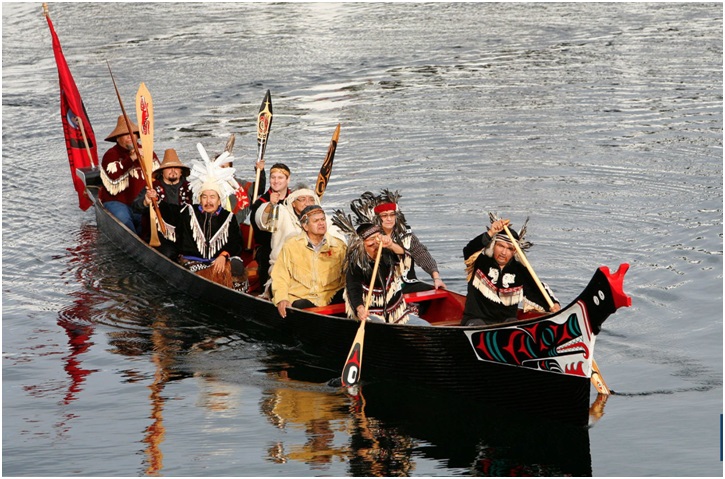![]() Dr. Linda Thyer is a family physician of European descent. She is a deep appreciator and supporter of the Indigenous world view, especially traditional wisdom regarding the Earth, and aims to lift Indigenous voices.
Dr. Linda Thyer is a family physician of European descent. She is a deep appreciator and supporter of the Indigenous world view, especially traditional wisdom regarding the Earth, and aims to lift Indigenous voices.
Anxious, distressed, and occasionally coughing or short of breath, my patients arrive at my family medicine practice displaying the physical and mental health impacts of the climate crisis such as the droughts which have devitalized the rainforests of the Canadian west coast. At COP27 in Egypt, many minds were turned to climate change and reducing the causative carbon emissions through various policies and technologies. But will these be enough to save our wounded planet and all of humanity?
The signs are clear that we are in a climate and ecological crisis of our own creation due to centuries of increasingly harmful behaviours towards the natural world. Canada signed on to the first global agreement to reduce emissions 30 years ago and yet our national emissions have consistently outpaced the alarming global rise. Despite technological advances, we are failing to provide a healthy and safe home for ourselves, much less for our children and grandchildren.
Our health is sustained by all of the Earth’s myriad living and non-living beings: the air-purifying plants, the life-sustaining waters, the nourishing soil, and much more. These gifts of the Earth are our life-support systems, and as Dr. Shannon Waters of the Coast Salish peoples writes, “our ecosystems are our health care systems”.
And yet we are destroying the very foundation of our health and wellbeing, which UN Secretary General Gutteres calls“collective suicide”.
Human health is inextricably dependent on the health and wellbeing of all life on Earth, and when we harm nature, we are ultimately harming ourselves. Sherri Mitchell, Penobscot lawyer, author and founding director of the Land Peace Foundation, writes about the natural world that “everything is interconnected and interdependent; the wellbeing of the whole determines the wellbeing of any individual part”. This fundamental connection to and dependence on nature juxtaposed with our disregard for our natural environment paints the picture of another crisis: a crisis of the spirit.
Leslie Sponsel, Professor Emeritus in Anthropology and Researcher in Spiritual Ecology, writes that while the technological, regulatory and scientific advances have reduced the impacts of climate change and provided some protection of nature, these measures have been insufficient and “ultimately the environmental crisis as a whole is a spiritual and moral crisis”.
When we value the accumulation of individual and corporate material wealth over the health and well-being of all life on Earth, we are in a moral crisis. When we fail to protect the many species of these lands, ignoring the crucial value of the natural world because we are blinded by the profits to be made, this is a crisis of the spirit.
So, if we wish to fully address the climate and ecological crises, we must also address the underlying spiritual crisis. Transforming our values and mindset then becomes an essential component of our long-term wellbeing and even survival.
The remedies for such spiritual malaise are evident in the wisdom of Indigenous peoples who have lived for millennia in harmony with all beings and recognize our crucial interdependency. Models of Indigenous views of health include spiritual health which underpins physical, emotional and mental health. Together these form a holistic concept of health, and the value of spiritual health is reflected in the loving reciprocity with which Indigenous people around the world co-inhabit their lands with the underlying principle of a deep connection to nature.
Traditional Indigenous practices are often based in gratitude for the many gifts of the Earth upon which our wellbeing depends. Gae Ho Hwako Norma Jacobs describes the foundational “Words that come before all else”, spoken by Haudenosaunee peoples at the beginning of a gathering to bring all minds together, recognizing and cherishing the life-sustaining relations to other beings, with these concepts at the heart of every decision.
Robin Wall Kimmerer writes “our first responsibility, the most potent offering we possess, is gratitude”, and that “gratitude…is powerful medicine.” She notes that “the next step in our cultural evolution, if we are to persist as a species on this beautiful planet, is to expand our protocols for gratitude to the living Earth.”
What would our world look like if we all brought our minds together at every meeting to remember, as we make decisions, our elemental connection to the Earth with all the life-sustaining beings? Would daily gratitude for nature’s provisions shift our mindset from one of dominance and exploitation to one of caring and protecting our planet?
Perhaps we can take some first steps towards healing ourselves and our home, and for the health of our children and grandchildren by giving thanks, every day, to Mother Earth.


